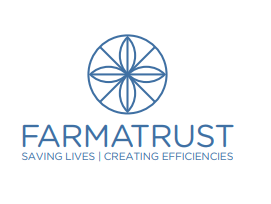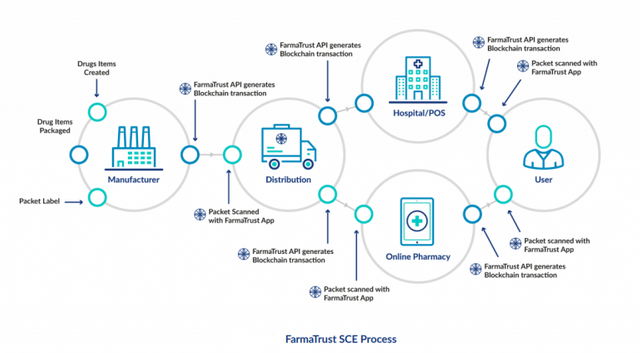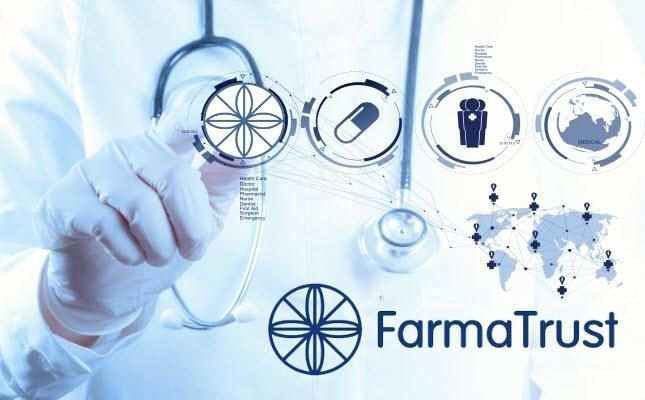FarmaTrust Blockchain Solution : Revolutionizing the Pharmaceutical Industry


According to WHO, ‘Counterfeit drugs are drugs that do not contain the active ingredients they are supposed to and consequently harm patients’. From drugs sold on illegal online site to life saving drugs, worldwide estimated sales of counterfeit drugs stood at $75billion in 2010(7) and more recently $217 billion in 2017 making it the most lucrative sector in global trade(1). Fraudulent drugs not only harm or kill millions around the world but they inflict serious damage on the brand names of major pharmaceutical manufacturers and reduce overall confidence in the drug health systems(1,7). With an annual loss of over $200 billion, counterfeit medicines greatly affect bottom lines of pharmaceutical firms and confirm a weakness in the industry supply system. Use of counterfeit drugs can also cause resistance or ultimate death from untreated ailments for instance an investigation of counterfeit anti-malaria drugs found that half of the 391 samples collected contained no active ingredient (artesunate) or too little to have any benefit(7).
Lack of ability of manufacturers to track authenticity throughout the supply chain consequently leads to the counterfeit drug problem. The recent transformation in the pharmaceutical industry commenced in 2016 following higher consumer expectations and an increase in scrutiny from regulators(1). In the US, the drug supply chain act implemented under the ‘Obamacare’ enables drug verification as well as facilitates the detection and recall of illegal drugs(6). Similarly, European track and trace regulations require detailed end-to-end compliance and traceability of drugs(4) but there still exist a lack of consistency and coordination in a globalized supply chain.
The blockchain could provide the required platform to increase trust and transparency as consumers can scan a bar code, see history and track pharmaceutical products. This patient empowering solution ensures information exchange and flow across different processes and ultimately guarantees drug identification, tracing, verification and notification in case a counterfeit drug is found(4,6). Under the blockchain technology, pharmaceutical supply chain stakeholders are enabled to increase efficiency likewise patients who profit by being able to independently verify products via the end-point solution.

The block chain technology also addresses the information asymmetry challenge which may occur between pharmaceutical firms and their investors. Due to the peculiarity of the industry’s lengthy R&D process, an absence of reliable information could arise thereby creating uncertainty with investors and complicating valuation. Trust and integrity between different stakeholders can be established through active collaboration and clever coding. Real time information is made visible to the regulator and funding parties thereby minimizing transaction costs, reducing information asymmetry and potentially reducing abnormal returns(6).

The identification of the counterfeit drug problem by FarmaTrust resonates with the findings stated above especially in developing countries were chaotic drug distribution channels, poor intellectual property protection and ‘epidemic’ spread of counterfeit drugs continuously threaten the survival of pharmaceutical industry(2,4). By harnessing the growing efficiency of artificial intelligence and big data analysis, FarmaTrust has created a blockchain solution that automates end-to-end tracking of medicinal products throughout the pharmaceutical supply chain. This platform eliminates counterfeit drugs, creates efficiencies in the pharmaceutical industry, and allows the purchase of genuine drugs anywhere and online(4). The blockchain-based ZOI supply chain information exchange platform securely verifies and tracks the supply of genuine products across various networks of pharmaceutical brands, manufacturers, distributors and supply chain operators, The platform also solves current track and trace challenges by creating a unique digital token to reference every serialized product key from point of manufacture to point of sale or return(4). It also records data relating to serialized packages as they pass through each point in the supply chain lifecycle, in accordance with track and trace regulatory requirements.
By focusing on key stakeholders including pharmaceutical companies, supply chain firms, regulators, government agencies and then the consumer, Farmatrust provides convenient access to real time information, reduced huge operational costs and increased confidence in pharmaceutical firms. Among other strategies, the company plans to explore partnership opportunities with developing countries as well as expand service offerings to developing markets in Asia and Africa(4).
The importance of the later cannot be overemphasized as the trade and consumption of counterfeit drugs is evidently highest within developing countries probably because the low GDP per capital income in these countries leave many consumers reliant on counterfeit drugs as the only affordable option(2,7). These countries which are characterized by unstructured heath systems, poor regulations and lack of manufacturing infrastructure often rely heavily on the importation of drugs from other developing and developed countries opening up an access to this menace although drug counterfeiters now use digital channels to penetrate developed countries(1).

As FarmaTrust intends to collaborate with global health industry bodies to expand service offering, it should be noted that enforcement of laws and regulations against counterfeit drugs in most terrains remains severely handicapped by weak institutions, possible lack of commitment to regulations or outright poor pharmaceutical regulatory environment(2,7). Local industry strategies in these countries should be expected to center on low drug prices, combining this with the FarmaTrust blockchain solution may guarantee success(2)
In some countries, local drug dispensers distribute both prescription and non-prescription drugs over the counter while other means of distribution are through pharmacists and hospitals(2). The use of Farmatrust application is therefore ideal but some developing countries also have a significant amount of consumers living in remote areas who hardly have any access to internet, therefore the use of this technology may be achieved by other alternatives that can still utilize information from the blockchain. The creation of certified centers where such consumers in a community can walk in and verify the authenticity of a drug may also be explored.
Finally, it is believed that pharmaceutical executives may not be inclined to spend more resources to fight counterfeit drugs as they are likely to overlook the benefits of rapidly evolving anti-counterfeiting technologies(5). However companies that adopt these technologies will reap a range of new benefits and eventually gain an edge over rivals relying on yesterday’s solutions(1).
This post was submitted to the @originalworks contest sponsored by farmaTrust
Click the link below to learn more
https://steemit.com/blockchain/@originalworks/260-steem-40-bonuses-sponsored-writing-contest-farmatrust
farma 2018
References
Behner, P, Hecht, M and Wahl, F (2017) Fighting counterfeit pharmaceuticals: New defenses for an underestimated - and growing - menace
BMI: Business Monitor International (2010). Nigeria Pharmaceutical and Healthcare report, including 10 year forecast to 2019.
Ding, M., Eliashberg, J. and Stremersch, S. (2014). Innovation and marketing in the pharmaceuticalindustry: Emerging practices,research, and policies. New York: Springer
Farmatrust White paper (2018)
Jacques, A. (2017) Trends and transformation in Pharma supply chain
Schöner, M. Kourouklis, D. Sandner, P and Jonas, E. (2017). Blockchain Technology in the Pharmaceutical Industry Manuela
WHO, 2010. Growing threat from counterfeit medicines. Bulletin of the World Health Organization, Vol. 88, Issue 4, pp. 241-320.
Hey @udywriter,
as written in Rules & Submission
you have to Add the word "farma2018" (without the quotes) at the very end of your article... could you edit it?
Haha, thanks @amico. Appreciate your vigilance!
LOL, I'm spending the night awake... at least I do something useful, right? ;)
If you like my effort, I could do better with some SP delegation... could you give me some power, @unprovoked?
Resteemed your article. This article was resteemed because you are part of the New Steemians project. You can learn more about it here: https://steemit.com/introduceyourself/@gaman/new-steemians-project-launch
Submitted.
In the future please remember to add the word farma2018 somewhere in your post. I see you have "farma 2018", but it should be without a space, just one word :) For this time it is already submitted so don't worry!
Thanks